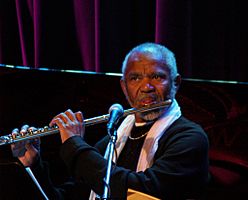Hubert Laws facts for kids
Quick facts for kids
Hubert Laws
|
|
|---|---|

Laws in 2007
|
|
| Background information | |
| Born | November 10, 1939 |
| Origin | Houston, Texas, United States |
| Genres | Jazz, classical |
| Occupation(s) | Musician |
| Instruments | Flute, piccolo |
| Years active | 1964–present |
| Labels | RKO/Unique, Sony, Music Masters Jazz, CTI, Columbia |
Hubert Laws (born November 10, 1939) is a famous American musician. He plays the flute, piccolo, and saxophone. Hubert Laws has been making music for over 50 years. He is known for playing many types of music. These include jazz, classical, pop, and rhythm-and-blues. He can easily switch between these different styles. Laws has been nominated for three Grammy Awards.
Contents
Hubert Laws' Early Life and Music
Hubert Laws, Jr. was born on November 10, 1939. He grew up in Houston, Texas. He was the second of eight children. Many of his brothers and sisters also became musicians. His brother Ronnie became a saxophonist. His sisters Eloise and Debra became singers.
Hubert started playing the flute in high school. He volunteered to play for the school orchestra. He quickly became good at playing jazz. He played in a jazz group in Houston called the Swingsters. This group later became the Modern Jazz Sextet and then The Crusaders. From ages 15 to 21, he played with the early Jazz Crusaders. He also played classical music during these years.
Studying Music in New York
In 1960, Hubert Laws won a scholarship. He went to the Juilliard School of Music in New York. There, he studied music and learned from master flutist Julius Baker. While studying, he also played with important orchestras. He played with the New York Metropolitan Opera Orchestra. He also played with the New York Philharmonic Orchestra from 1969 to 1972.
During this time, he recorded classical songs. His 1971 album Rite of Spring featured classical pieces. He played music by famous composers like Gabriel Fauré and Bach. This album helped him gain fans of classical music. He returned to classical music in 1976 with his album Romeo and Juliet.
Hubert Laws' Career as a Bandleader
While at Juilliard, Hubert Laws played the flute at night. He performed with several groups. From 1963 to 1967, he played with Mongo Santamaría. He also played the tenor saxophone with this group.
In 1964, he started recording his own music. He became a bandleader for Atlantic Records. He released albums like The Laws of Jazz, Flute By-Laws, and Laws' Cause. He also played on albums by other artists. These included Ashford & Simpson, Chet Baker, and George Benson. He recorded an album called The Laws with his brother Ronnie.
Playing on Famous Albums
Hubert Laws played the flute on Gil Scott-Heron's 1971 album Pieces of a Man. This album included the famous jazz poem "The Revolution Will Not Be Televised". In the 1970s, Laws was part of the New York Jazz Quartet. You can also hear him playing the tenor saxophone on some records from that time.
In 1981, Laws produced an album for his sister Debra Laws. It was called Very Special.
Later Career and Collaborations
Hubert Laws continued his music career in the 1990s. In 1991, he played on the album Spirituals in Concert. This album featured opera singers Kathleen Battle and Jessye Norman. Critics praised his albums My Time Will Come (1990) and Storm Then Calm (1994). They said these albums were as good as his early 1970s work.
He also recorded a tribute album for jazz pianist Nat King Cole. It was called Hubert Laws Remembers the Unforgettable Nat King Cole. This album also received great reviews.
Working with Many Artists
Hubert Laws has played and recorded with many famous musicians. Some of these artists include Herbie Hancock, Chick Corea, Nancy Wilson, Quincy Jones, and Paul McCartney. He also worked with Paul Simon, Aretha Franklin, Ella Fitzgerald, and Stevie Wonder.
In 1998, Laws recorded with the group Morcheeba. This was for a special album called Red Hot + Rhapsody. This album honored George Gershwin. It helped raise money for charities that spread awareness about AIDS.
In 2006, a video called Hubert Laws Live 30-year Video Retrospective was released. It showed his performances over 30 years. It included appearances on The Tonight Show Starring Johnny Carson.
Awards and Honors
Hubert Laws has received important awards for his music.
In June 2010, he received a special award. The National Endowment for the Arts gave him a lifetime achievement award for his work in jazz.
Laws also received the 2011 NEA Jazz Masters Award. This is a very high honor for jazz musicians.
Grammy Award Nominations
Hubert Laws has been nominated for three Grammy Awards:
| Year | Title | Artist | Category | Role | Result |
|---|---|---|---|---|---|
| 1973 | Morning Star | Hubert Laws | Best Jazz Performance by a Soloist | Primary artist, composer, flute | Nominated |
| 1974 | In the Beginning | Hubert Laws | Best Jazz Performance by a Soloist | Primary artist, composer, flute | Nominated |
| 1979 | Land of Passion | Hubert Laws | Best R&B Instrumental Performance | Primary artist, composer, flute | Nominated |
Discography
- The Laws of Jazz (1964)
- Flute By-Laws (1966)
- Laws' Cause (1969)
- Crying Song (1969)
- Afro-Classic (1970)
- The Rite of Spring (1971)
- Wild Flower (1972)
- Morning Star (1972)
- Carnegie Hall (1973)
- In the Beginning (1974)
- The Chicago Theme (1975)
- The San Francisco Concert (1975)
- Romeo & Juliet (1976)
See also
 In Spanish: Hubert Laws para niños
In Spanish: Hubert Laws para niños
 | Claudette Colvin |
 | Myrlie Evers-Williams |
 | Alberta Odell Jones |

